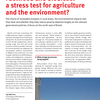Brazil: Fuelwood and biodiesel - a stress test for agriculture and the environment?
State transfer payments and programmes such as "Light for All" have enabled even the regions with entrenched poverty in Brazil's north-east to report rising growth rates. This has led to increased demand for energy from consumers and producers alike. Alongside hydropower, the most important source of this energy is fuelwood from the Caatinga tropical dry forest. The government is also promoting biodiesel production with the aim of reducing dependency on fossil fuels and generating new sources of income for poor smallholders.
This article describes the impacts of economic growth and state policy-making on energy production in rural areas and explains how sustainability can remain a priority even in the face of growing demand for energy.
Ingo Melchers
Until August 2010 director of the programme
Poverty-oriented Regional Development in Brazil
Deutsche Gesellschaft für Technische Zusammenarbeit (GTZ)
Eschborn, Germany
Ingo.Melchers@gtz.de




